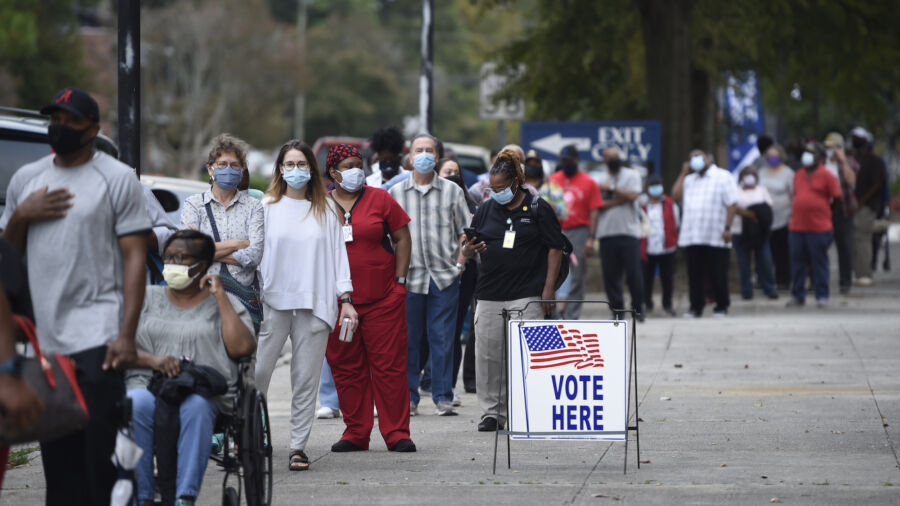Federal judges in Georgia and Texas have struck down key provisions of elections laws passed two years ago as Republicans sought to bolster election integrity as allegations of fraud and other irregularities during the hotly contested 2020 presidential election fueled calls for elections to be made more secure.
In Texas, U.S. District Judge Xavier Rodriguez nixed a provision in state law that required officials to reject mail-in ballots with ID numbers that don’t match the ones on voter registration forms, according to a summary judgment issued on Aug. 17 (pdf).
The now-abolished provision required that mail-in ballots be rejected if they bear a different Texas driver’s license number or ID number of the voter than what was on their original application for voter registration.
Another provision in Texas law that Judge Rodriguez struck down was a requirement that a mail-in ballot can only be accepted if the ID number on the carrier envelope or signature sheet matches the number on the voter registration application.
The court ruled that the provisions, which were adopted in September 2021 as part of Texas Senate Bill 1, violated the Civil Rights Act of 1964.
The Justice Department characterized the restrictions contained in the now-voided provisions as “errors or omissions that are not material in determining whether voters are qualified” to vote or cast a mail ballot.
“The District Court’s decision affirms what the Justice Department has argued for nearly two years: these provisions of Texas Senate Bill 1 unlawfully restrict the ability of eligible Texas voters to vote by mail and to have that vote counted,” Attorney General Merrick Garland said in a statement.
‘Easier to Vote and Harder to Cheat’
The ruling originates from a lawsuit filed in 2021 by La Union Del Pueblo Entero against Texas Gov. Greg Abbott that challenges multiple provisions of Senate Bill 1, including the two that required voter ID numbers to match.
When Mr. Abbott signed the bill on Sept. 7, 2021, he hailed the measure as bolstering vote integrity amid persistent doubts about election security in the wake of the 2020 election.
The bill created uniform statewide voting hours, maintained and expanded voting access for registered voters in need of assistance, prohibited drive-through voting, and authorized poll watchers to observe more aspects of the election process.
“Senate Bill 1 ensures trust and confidence in our elections system—and most importantly, it makes it easier to vote and harder to cheat,” Mr. Abbott said in a statement at the time. “Safe and secure elections are critical to the foundation of our state.”
The bill also banned the distribution of unsolicited mail-in ballot applications and gave voters with defective mail-in ballots the opportunity to correct the defect.
Mr. Abbott’s office did not immediately respond to a request for comment on the latest court ruling.
‘Common Sense Rules Banning Ballot Harvesting’
In Georgia, U.S. District Judge J.P. Boulee delivered a mixed judgment that both sides sought to portray as a victory.
In one order (pdf), Judge Boulee temporarily prohibited officials from enforcing penalties for so-called “line warming,” or providing food and water to voters waiting in line, as long as they are more than 150 feet from the voting place.
In another order (pdf), he blocked provisions of Georgia’s Senate Bill 202 that required election officials to reject absentee ballots if the birth date on the outer envelope did match the birth date listed on the voter’s registration form.
In a third order (pdf), Judge Boulee rejected claims brought by plaintiffs that certain restrictions on ballot drop boxes imposed by the law deny voters with disabilities meaningful access to absentee voting.
The plaintiffs wanted drop boxes moved outdoors and for restrictions on hours of access to them to be removed, while the defendants argued this would impose significant burdens on counties by requiring them to buy surveillance equipment or hire 24-hour security.
The mixed rulings led both sides to declare victory.
Georgia Secretary of State Brad Raffensperger, a Republican, said in a news release that the court upheld key parts of the law.
“I am glad that the court upheld Georgia’s common sense rules banning ballot harvesting and securing absentee ballot drop boxes,” he said. “Georgia’s voting system is accessible to all voters, with multiple options for voters to choose how they want to exercise their right to vote.”
Groups who sued to block the law praised the ruling.
“Today’s decisions are important wins for our democracy and protecting access to the ballot box in Georgia,” John Cusick, assistant counsel at the NAACP Legal Defense Fund, said in a statement.
It comes as Republicans continue to push for measures that bolster election integrity, though experts say more remains to be done.
States made major adjustments to the voting process amid the COVID-19 pandemic, including a massive expansion to mail-in voting.
Republicans have argued that the expansion created loopholes for voter fraud due to a lack of safeguards and lax voter identification rules.
Hans von Spakovsky, a Heritage Foundation senior legal fellow and manager of its election law reform initiative, told The Epoch Times in a recent interview that there’s been progress in closing some of the loopholes, but that there’s more to do.
The Heritage Foundation keeps a scorecard for states for election integrity. The gauge looks at 12 areas, with more than two-thirds of the score weighted for three: voter ID implementation, the accuracy of voter registration lists, and absentee ballot management.
“Tennessee is No. 1, but it only got 84 out of 100,” Mr. von Spakovsky told The Epoch Times. “Even the best state in the country needs to make improvements.”
He said the top three things states need to do are to require voter ID for both in-person and absentee balloting, do a better job of maintaining and verifying accurate voter rolls, and strengthen rules for handling absentee ballots.
Dan M. Berger contributed to this report.
From The Epoch Times


